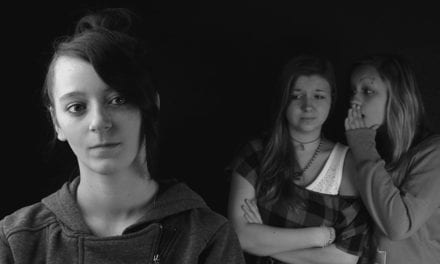Jill was startled awake by a sound. She sat up in bed, staring into the darkness. The blankets had been thrown aside. As her eyes adjusted, she could see them churned up next to her, half on the floor. The sound was not the usual whistle of the wind coming through gaps in the old, barely insulated house, rattling the windows, stirring the thin curtains. It was not one of the neighborhood strays barking or a siren. Those were common.
It was a voice, deep, male, accented. It said one word, close to her ear. She patted the bed in case anyone had crept in beside her in the night, so close had the voice seemed. There was no one. The voice had said: “Clever.”
She had heard that word said by that voice earlier in the evening at the house of a Hungarian professor, a former college teacher of her daughter. She had never been to a professor’s house before. It was a small gathering of one-time students. Her daughter was unsure she should go and had asked Jill to come with her for support. It was the Professor himself who had singled out Jill by name and called her “clever.” She was tempted to think there might be another Jill in the room and actually looked around. But she was the only one.
No one had ever told her that she was smart or clever or intelligent. She had plodded along in school and was diligent at her job. Come to think of it, she had rarely been complimented. Her mother was the stern sort, not given to affection but quick to criticize. She never knew her father.
Her daughter was the product of a one-night stand, her only sexual encounter. The guy never said much to her other than rough commands. “Here.” “Move.” Certainly, no one had told the chunky moon-faced girl that she was worth anything.
Turning on the light, Jill got up and put on her robe. She had had the same pink chenille robe since her daughter was born, twenty years ago. She had bought it to celebrate. The pregnancy was over. She had a baby. She still took comfort wearing it, even in its frayed state. Holding it close around her, she went into the kitchen to make tea.
“Clever.” The word repeated in her mind like a catchy tune. Had the professor really called her “clever”? He had been talking about climate change. She had said something, she could not remember what, and he had given her the compliment. He had been looking straight at her. Not like most people, who looked over her shoulder or above her head when they spoke to her. With the Professor, she had the sense of being really seen. This made all the others look her way, at the older woman, someone’s mother. She had felt herself blush.
The Professor appeared to be an old-fashioned gentleman. He bowed slightly when her daughter introduced her, causing a strand of his black hair, probably dyed, to fall forward onto thick eyebrows. He took her hand and raising it to his pursed lips, kissed it lightly, something she had only seen in movies. He attended to her comfort, offering her a chair, a drink, a cigarette, and making sure she met everyone.
Then he, a professor, who no doubt surrounded himself with people of the highest intelligence, including the very smart students who used words she had never before heard, called her “clever.” She, who had never been to college, who was just an ordinary woman, up until then nothing special.
Standing in the kitchen with a mug of tea in her hands, Jill heard the voice again. “Clever.” She looked around. No one was there.
She knew she had heard the word used before. Then she remembered. It was her mother. She used to say, “you’re getting to be too clever for your own good.” If Jill tried to talk to her about something she had learned in school—the Civil War, the meaning of light years, algebra—or something she heard on the news—the earthquake in Haiti, the recession—her mother responded with that expression.
When Jill came to her in tears because she was pregnant, all her mother said was, “I guess you’ve been too clever for your own good.” She had forgotten that.
In the car on the way home from the gathering at the professor’s house, Jill had said, “That was much better than I thought it would be. The Professor. He seems very nice.”
“Now, Mom,” her daughter had said, “Remember what I told you. He may or may not still be a professor. At least in this college. He was busted for collecting dirty photos of young girls. He was fired. That’s why I was unsure about going tonight. I don’t know how come he wasn’t jailed or deported.”
“Maybe he was innocent. Maybe that is why he is still here and free.”
“Yeah, well. Maybe.”
Her daughter didn’t say anything else, which was good, because Jill thought she was trying to ruin the compliment. If the Professor were no longer a professor, if he was just an ordinary person, even a criminal, he could not decide that she was clever. But he lived in a house filled with books in the part of town where all the professors lived. There was a grand piano in the front room, and a working fireplace. Real paintings hung on the walls, mostly portraits of people who might have been the Professor’s relatives. Clearly, the Professor was an important educated man.
The next morning, Jill decided that she would drive by the Professor’s house before she went to work. She would go around his block at normal speed, just to see what his house looked like in the daytime. It turned out to be an older two-story brick residence with a tidy front yard. A wrought iron fence surrounded the property. Although it was daylight, the curtains were still drawn. A newspaper lay across the front steps, not yet picked up.
Jill told herself she was satisfied. She had seen the house in daylight. Maybe she had hoped to see the Professor step outside in an elegant maroon robe. As he was bending to pick up the paper, he would see her. A smile of recognition would cross his face. Delightedly, he would wave at her, then beckon. She would park the car and get out.
“So pleased to see you, Mrs. Jill. Will you please to join me for coop coffee?”
She would ascend the stairs. He would hold the door open for her. Then he would gently take her by the elbow and guide her into a sitting room. He would excuse himself. A few minutes later, he would reappear with a coffee service.
“Now please to tell how you coome to do clever remark oother evenink.”
But even though she returned for several mornings in a row, she never saw him. Each day, a fresh newspaper lay on the steps, suggesting that it was being picked up at a later time. On the third morning, she distinctly heard that word again, just as she was driving past his front door. Surely, it was her imagination or perhaps a street noise that she interpreted as the sound of the word. She had lightly stepped on the brake and looked around. The Professor was not outside. If he were peeking at her through the curtains and saying the word inside the house, it would not have been possible for her to have heard.
On succeeding days, there were times she heard the word and times she did not. Now it was a habit for her to detour to the Professor’s street every day before going to work. Always the curtains were drawn. Always, a fresh newspaper had been tossed on the front steps. The Professor did not appear, although she heard his voice. “Clever.”
Then there came a time when the unexpected happened. Just as her car approached the house, she saw the door open. There was a pounding in her chest. For a moment, no one appeared. Then an orange-haired woman, about the professor’s age, came out and hurried down the stairs. Without pause, she got into the smart red Toyota at the curb, adjusted her long camel coat beneath her, closed the door, and maneuvered out of the parking space.
Jill gasped. She braked the car. Could this woman possibly be the Professor’s lover? Was she the one who picked up the newspapers? She had to follow her and find out who she was. As she drove, Jill began sobbing out loud, wiping her face on her sleeve. That was her professor. The orange-haired woman had no right to be there.
As these thoughts came to her, she knew she was being ridiculous. She and the Professor were not even friends. He might not even remember her. She was blowing up his compliment into something it probably wasn’t. A single word. Said a single time. Yet, out of the Professor’s presence, she had heard him say it to her many times. That meant something, didn’t it?
She drove right behind the orange-haired woman, not caring if it was nerve-wracking to tailgate. After ten minutes of driving this way, the car pulled into the elementary school. Jill pulled in, too, and idled her car in a visitor’s sport. The red Toyota had parked in a space for staff. She saw the woman get out, her hair shining in the sunlight as she walked to the school and entered. Jill sat there without turning off the motor. The engine chugged, as if impatient. Digging her phone out of her purse, she googled the staff of the school. The orange-haired woman was a first-grade teacher. Her photograph was posted in the directory. Her name was Irena Petrov. Petrov. What kind of name was that? Russian? The woman was a foreigner?
Now, Jill guessed that the Professor and Irena Petrov spoke to each other in their incomprehensible languages. Even if she were with them, she wouldn’t be able to understand. She would be left out. Irena Petrov would be the one who made clever remarks. Jill imagined the two of them sitting in the Professor’s parlor, relaxed, smoking, the Professor laughing at the orange-haired woman’s witticisms.
She had to get to work. Gunning the motor while thinking about Irena Petrov, she pulled out onto the road. She accelerated hard. Speed was the only thing that might calm her, the feel of the car barreling along the blackened pavement, pulling away from the school fast. Her teeth clenched as if biting. Her nostrils flared with forced exhalations.
At work, she could not concentrate. All she could think of was of Irena Petrov. It was no doubt because of her that she had not heard the Professor’s compliment that day. What if she prevented the Professor from ever saying the compliment again? Jill was horrified by this thought. Maybe the Professor would want to say it, except that Irena Petrov could get angry. She might make a clever, sarcastic comment that would be wounding to the Professor. She would deny Jill what was rightfully hers.
This was intolerable. Jill took off early from work, just before school closing time. She drove back to the school and parked in the visitors’ area again. The red Toyota was in sight. As soon as Irena Petrov appeared and started driving, Jill followed her to a house that was apparently her home. Now that she knew where she lived, Jill no longer went to the Professor’s house each morning. Instead, she went to Irena Petrov’s. Whenever she did not see the orange-haired woman emerge in time for her job at the school, Jill assumed she was at the Professor’s house.
Jill understood that it did not matter how often the Professor and Irena Petrov were together. Yet she could not stop herself from needing to know whatever details were available to her. Which nights they spent together? Who brought in the newspaper? What happened on the weekends? Jill had fallen into the habit of parking near Irena Petrov’s house and watching for activity. On Saturdays and Sundays, she might see her leave and come back with groceries, tending to her garden, sweeping her front stoop, or—even worse—driving to the Professor’s house.
Sometimes, she followed Irena Petrov to the supermarket. It was of interest to her to see what items were put in her cart. Celery. Spices. Wheat bread. Jill put the same items into her cart. She followed her out, squinting to see in the harsh sunlight.
She watcher her drive away from the store in her late model Toyota. With mounting bitterness, Jill noted that Irena Petrov owned a nearly new Toyota while she drove an old beat-up Chevy. How did a school teacher afford a newer car? Maybe it was a gift from the Professor, a gift that should have been hers. Irena Petrov was a thief, she decided. She had stolen what really belonged to another. She could not be permitted to get away with what amounted to a crime.
Acting on impulse, Jill drove to the hardware store and bought a can of black spray paint. When it was very late, she drove to Irena Petrov’s house, parking a short distance away. Not really caring if she were seen, she carried the can, shaking it while she walked up to the red Toyota, which was parked in the street. Then, starting at the back end and moving forward to the front, she sprayed “B-I-T-C” in huge letters. She added the “H” to the hood. Then she tossed the can onto Irena Petrov’s front yard and left.
On the way home, Jill had a fit of giggles. Soon, she was laughing out loud at the thought of Irena Petrov opening her door the next morning, then turning to lock it. She would hurry down the stairs and take quick steps toward the car. She would not want to be late for her class at the school. Suddenly, she would see and stop in her tracks. She would drop her purse, her books. She would cover her mouth with her hand, as if preventing a screech. She would walk slowly around the car, taking in the offensive word, realizing it was meant for her.
Then she would know. That one word, “bitch,” would stay in her head all day. She would wonder what it meant, who had painted it on her car. Perhaps, as the day wore on, she would come to know that she was indeed a “bitch,” someone who took what did not belong to her. She might guess that the Professor belonged to someone else, and she was a “bitch” for stealing him. When she saw her reflection or looked in the mirror, she might find herself whispering the word “bitch” repeatedly. That word, so descriptive of what she was, would never leave her consciousness from that day on.
It pleased Jill greatly to imagine the low state to which Irena Petrov might sink as the word burrowed into her mind, like a brain-eating worm. The woman who had appeared to be so full of pride, with her ostentatious orange hair and boorish red Toyota, would be humbled. As time went by and the word continued to plague her, she might age, gain weight, take to drink. The Professor would lose interest as she became slovenly. No longer would she be invited to his house.
How delighted Jill was. With renewed confidence, she stopped following Irena Petrov and returned to the Professor’s house each morning, sure he would soon come out as she was passing and invite her in. Everything was the same. The curtains were still drawn. A fresh newspaper lay on the steps. All she had to do was to be patient and make the daily trip.
But on the fourth morning, she was appalled to see Irena Petrov emerge from the Professor’s house again. The Toyota, which had been parked further down the road, was unmarked. Apparently, the word “bitch” had been erased, somehow. The color of the car seemed an even brighter red. It might have been polished after being cleaned.
Jill had slowed down. A car behind her beeped. Irena Petrov turned to look. Their eyes met. Irena glanced at her in a mocking way, Jill thought. There may have been a slight smile on her face. She had triumphed. The Professor was still hers. Her car was unblemished. She had stopped the compliment, which Jill no longer heard.
Jill drove on but had to stop on a quiet street a few blocks away. She sat in her car weeping. She wanted to die. She wanted to kill herself. She wanted to kill Irena Petrov. The words of her mother came back to her. “You’re too clever for your own good.” This made her cry harder as she realized the truth of those words.
What of her own good had she accomplished? She had become infatuated with a man who may or may not be a professor. As her daughter had told her, he might even have been a collector of pornography, perhaps a pornographer who took pictures of young girls. Teens? Children? Maybe Irena Petrov, a school teacher, supplied the children.
Yet none of this mattered to Jill. Even if the Professor was involved in the criminal abuse of children, she still wanted him for herself. As shameful as it was to admit, her heart could not be controlled. She might be sitting several blocks away, but she was still waiting for him to walk by, see her, and greet her. She was waiting to hear him call to her as she drove by his house, as she knew she would continue to do.
For the rest of her life, she would wait to hear his compliment again.






















